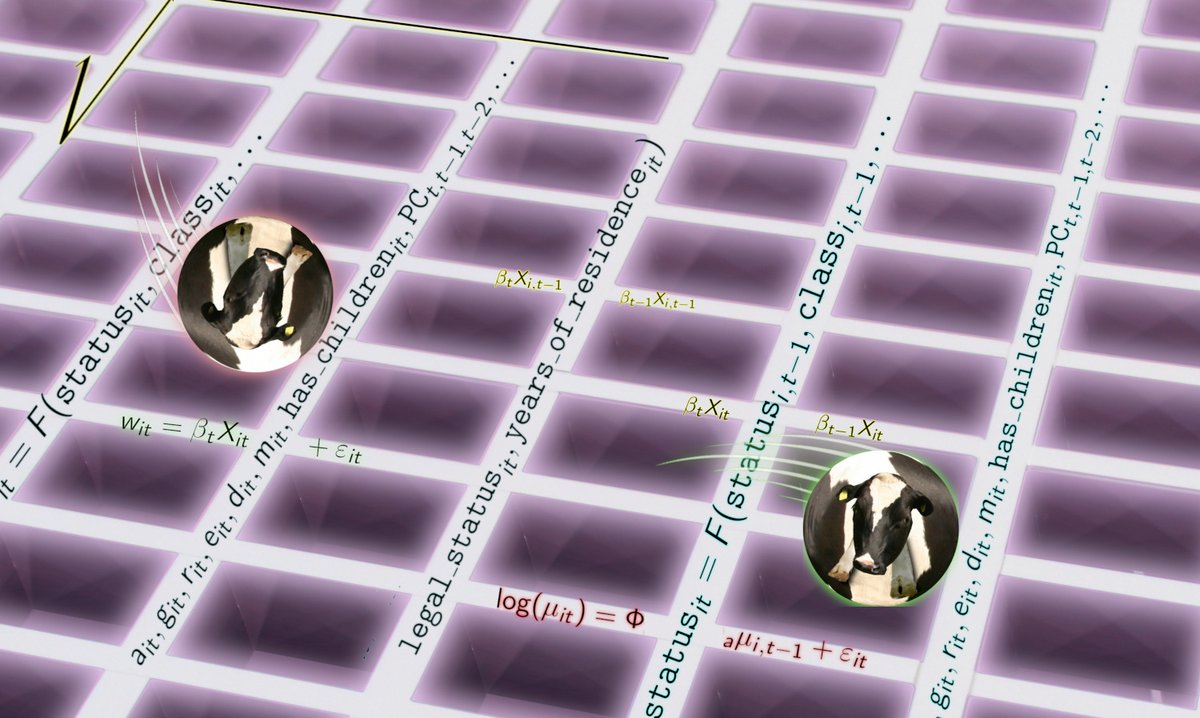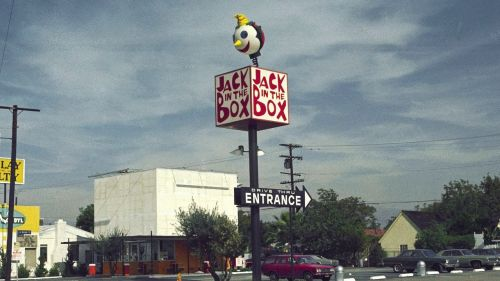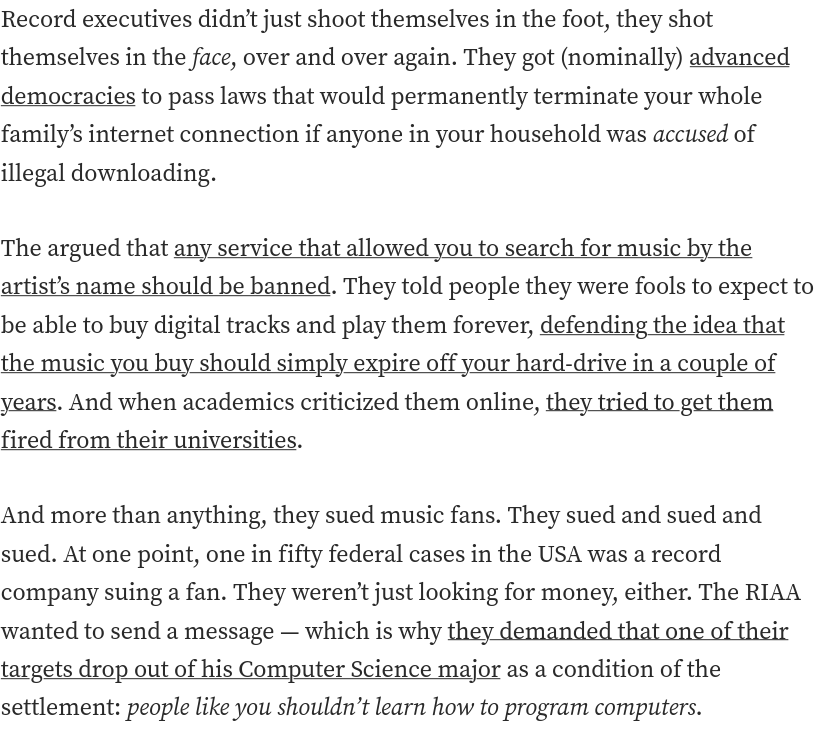When students of statistics are introduced to creating and interpreting models, they are introduced to George Box's maxim:
*All models are wrong, some are useful.*
It's a call for humility and perspective, a reminder to superimpose the messy world on your clean lines. 1/
*All models are wrong, some are useful.*
It's a call for humility and perspective, a reminder to superimpose the messy world on your clean lines. 1/

If you'd like an essay-formatted version of this thread to read or share, here's a link to it on pluralistic.net, my surveillance-free, ad-free, tracker-free blog:
pluralistic.net/2023/04/03/all… 2/
pluralistic.net/2023/04/03/all… 2/
Even with this benediction, modeling is forever prone to the cardinal sin of insisting that complex reality can be reduced to "a perfectly spherical cow of uniform density on a frictionless plane." 3/
Partially that's down to human frailty, our shared inability to tell when we're *simplifying* and when we're *oversimplifying*.
But complex mathematics are also a very powerful smokescreen. 4/
But complex mathematics are also a very powerful smokescreen. 4/
So few of us are able to interpret mathematical models, much less interrogate their assumptions. Thus models can be used as "#EmpiricalFacewash," in which bias and ideology are embedded in equations and declared to be neutral, because "math can't be racist." 5/
The problems with models have come into increasing focus, as machine learning models have increasingly been used to replace human judgment in areas from bail assessment to welfare eligibility to child protective services interventions:
memex.craphound.com/2018/01/31/aut… 6/
memex.craphound.com/2018/01/31/aut… 6/
But even amidst this increasing critical interrogation of models in new domains, there is one domain where modeling is all but unquestioned: #economics, specifically, #macroeconomics, that is, the economics of national government budgets. 7/
This is part of a long-run, political project to "get politics out of budgeting" -a project as absurd as "getting wet out of water." 8/
Government budgeting is *intrinsically, irreducibly political*, and there is nothing *more* political than insisting that your own preferences and assumptions are "empirical" while anyone who questions them is "doing politics." 9/
This model-first pretense of neutrality is a key component of #neoliberalism, which saw a vast ballooning of economists in government service - #FDR employed 5,000 economists, while #Reagan relied on 16,000 of them. 10/
As the jargon and methods of economics crowded out the language of politics, this ideology-that-insisted-it-wasn't got a name: #economism. 11/
Economism's core method is reducing human interaction to "incentives," to the exclusion of morals or ethics - think of #MargaretThatcher's insistence that "there is no such thing as society." 12/
Economism reduces its subjects to #HomoEconomicus, a "rational," "utility-maximizing" automaton responding robotically to its "perfect information" about the market.
Economism also insists that *power* has no place in predictions about how policies will play out. 13/
Economism also insists that *power* has no place in predictions about how policies will play out. 13/
This is how the #ChicagoSchool economists were able to praise #monopolies as "efficient" systems for maximizing "#ConsumerWelfare" by lowering prices without "wasteful competition." 14/
This pretense of mathematical perfection through monopoly ignores the problem that anti-monopoly laws seek to address, namely, the corrupting influence of monopolists, who wield *power* to control markets and legislatures alike. 15/
As Sen John Sherman famously said in arguing for the #ShermanAct: "If we will not endure a King as a political power we should not endure a King over the production, transportation, and sale of the necessaries of life."
marker.medium.com/we-should-not-… 16/
marker.medium.com/we-should-not-… 16/
Economism says that we can allow monopolies to form and harness them to do only good, enforcing against them when they abuse their market dominance to hike prices. 17/
But once a monopoly forms, it's *too late* to enforce against them, because monopolies are both #TooBigToFail and #TooBigToJail:
doctorow.medium.com/small-governme… 18/
doctorow.medium.com/small-governme… 18/
Today, economism is helpless to do anything about #inflation, because it is ideologically incapable of recognizing the inflation is really #excuseflation. 19/
That's where monopolists blame pandemic supply shocks, Russian military belligerence and supposedly overgenerous covid relief programs for their own greedy profiteering:
pluralistic.net/2023/03/11/pri… 20/
pluralistic.net/2023/03/11/pri… 20/
Mathematics operates on discrete quantities like prices, while *power* is a *quality* that does not readily slot into an equation. That doesn't mean that we can safely discard power for the convenience of a neat model. 21/
Incinerating the qualitative and doing arithmetic with the dubious quantitative residue that remains is no way to understand the world, much less run it:
locusmag.com/2021/05/cory-d… 22/
locusmag.com/2021/05/cory-d… 22/
Economism is famously detached from the real world. As Ely Devons quipped, "If economists wished to study the horse, they wouldn’t go and look at horses. They’d sit in their studies and say to themselves, ‘What would I do if I were a horse?’"
pluralistic.net/2022/10/27/eco… 23/
pluralistic.net/2022/10/27/eco… 23/
But this disconnection isn't merely the result of head-in-the-clouds academics who refuse to dirty their hands by venturing into the real world. 24/
Asking yourself "What would I do if I were a horse?" (or any other thing that economists are usually not, like "a poor person" or "a young mother" or "a refugee") allows you to empiricism-wash your biases. 25/
Your prejudices can be undetectably laundered if you first render them as an equation whose details can only be understood by your co-religionists. 26/
Two of these if-I-were-a-horse models reign invisibly and totally over our daily lives: the #CongressionalBudgetOffice model and the #PennWhartonBudgetModel. 27/
Every piece of proposed government policy is processed through these models, and woe betide the policy that the model condemns. Thus our entire government is conducted as a giant, semi-secret game of #ComputerSaysNo. 28/
This week, @TheProspect is conducting a deep, critical dive into these two models, and into the enterprise of modeling itself. 29/
The series kicks off today with a pair superb pieces, one from Nobel economics laureate @JosephEStiglitz, the other from *Prospect* editor-in-chief @ddayen and @rakeen_mabud, chief economist for @Groundwork. 30/
Let's start with the Stiglitz piece, "How Models Get the Economy Wrong," which highlights ways in which models' hidden assumptions led us to sideline good ideas (like increasing spending in a recession) and make bad policy (cutting taxes on the rich):
prospect.org/economy/2023-0… 31/
prospect.org/economy/2023-0… 31/
First, Stiglitz sets out a general critique of the assumptions in neoclassical models, starting with the "#EfficientMarket" hypothesis, that holds that the market is *already* making efficient use of all our national resources. 32/
That means that any government spending will "crowd out" efficient private sector activity and make us all poorer.
There are trivially obvious ways in which this is untrue: every unemployed person who wants a job is *not* being used by the market. 33/
There are trivially obvious ways in which this is untrue: every unemployed person who wants a job is *not* being used by the market. 33/
The government can step in - say, with a federal #JobsGuarantee - and employ everyone who wants a job but isn't offered one by the public sector, and by definition, this will not crowd out private sector activity. 34/
But also, the private sector is *riddled* with inefficiencies. Google and Facebook don't make "efficient" use of capital in burning billions to increase their surveillance (also, the fortune Meta torched for its "#metaverse" dead mall):
35/
35/
Then we come to some of the bias in the models themselves, which consistently undervalue the long-run benefits of infrastructure spending. 36/
Public investments "yield very high returns," which means that even if a public sector project reduces private sector investment, the private investments that remain produce a higher yield, thanks to public investment in skilled workers and efficient ports, roads and trains. 37/
A commonplace among model users is that we must make "#TheBigTradeoff." Either we reduce inequality, or we increase prosperity, but not both. 38/
Because reducing inequality means taking resources away from the business leaders who would otherwise build the corporations whose products would make us all better off. 39/
Organizations from the #OECD to the #IMF have recognized that inequality is itself a brake on economic growth, fostering destructive "#RentSeeking" (seen today online in the form of #enshittification). 40/
But the most common macroeconomic models continue to presume that an unequal society will be as efficient as a #pluralistic one. 41/
Indeed, model-makers treat attention to inequality as an error bordering on a mortal sin - the sin of caring about "#DistributionalOutcomes" (that is, who gets which slice of the pie) rather than "growth" (whether the pie is getting bigger). 42/
Stiglitz says that model makers have gotten a little better in recent years, formally disavowing #HerbertHoover's idea of #ExpansionaryAusterity, which is the idea that we should cut public spending when the economy is shrinking. 43/
Common sense tells us that this will make it shrink faster, but expansionary austerity (incorrectly) predicts that governments that cut spending will produce "investor confidence" and trigger more private investment. 44/
This reliance on what @paulkrugman calls the "Confidence Fairy" is tragically misplaced. Hoover's cutbacks made the #GreatDepression worse. So did IMF cutbacks in "East Asia, Greece, Spain, Portugal, and Ireland." 45/
Expansionary austerity is politics dressed up as economics. Indeed, the political ideology subsumed into our bedrock models has caused governments to fail to anticipate crisis after crisis, including the 2008 #GreatFinancialCrisis. 46/
The politics in modeling are especially obvious in the process running up to the Trump tax cuts (Trump draws with a fisted crayon where others delicately shade with a fine pencil, making it easier to see the work for what it is) (see also: E. Musk). 47/
Axiomatic to model-building is the idea that if you tax something, you'll get less of it ("#IncentivesMatter"). Thus the theory of corporate tax: "taxing corporations on the money they'd use to build new plant and hire new workers, means they will do less of those things." 48/
That's a reasonable assumption - which is why we *don't* tax companies on capital investments and their payrolls. These expenses are deducted from a company's profits *before* it calculates its taxes. Corporate taxes are levied on *profits*, net of labor and plant. 49/
But when the CBO modeled the Trump cuts, it operated on the assumption that the existing tax system was punishing companies for hiring people and expanding operations, and thus concluded the reducing taxes would lead to more of these activities. 50/
On that basis, the tax cuts were declared to be expansionary, a means of driving new private sector activity. 51/
In reality, all they did was create more profits, which rich people used to bid up the prices of assets, creating a dangerous asset bubble - not investment in productive capacity. 52/
In "Hidden in Plain Sight," the other *Prospect* piece that dropped today, Dayen and Mabud tell us just how wrong the models were about the Trump cuts:
prospect.org/economy/2023-0… 53/
prospect.org/economy/2023-0… 53/
The CBO predicted that the cuts would drive a 0.7% increase in GDP over a decade, while Penn Wharton predicted 0.6-1.1% growth. Both were very, very wrong:
npr.org/2019/12/20/789…
Despite the manifest defects of these models, we still let them imprison our politics. 54/
npr.org/2019/12/20/789…
Despite the manifest defects of these models, we still let them imprison our politics. 54/
When @SenWarren proposed a 2% #WealthTax on assets over $50m, she said it would reduce billionaires' fortunes by $3.75T over 10 years, but Penn Wharton knocked $1T off it, declaring the real impact of the policy would be a reduction in investment, depressing long-run growth. 55/
The politics of a wealth tax are sound - the kind of politics that wins elections and restores faith in democracy - but the economism of models sweeps the proposal off the table and into the dustbin of history. 56/
The Penn Wharton model simply refuses to factor in absolutely key aspects of a wealth tax plan, from the impact of increased enforcement to the economic benefits of universal child care, increased education funding, student debt cancellation. 57/
These and other programs could be enacted with the fiscal space opened up by reducing billionaires' spending power.
The Warren policy is rare because we got to hear about it - through a national election campaign - before it was strangled by the model-makers. 58/
The Warren policy is rare because we got to hear about it - through a national election campaign - before it was strangled by the model-makers. 58/
More often, proposals like this are quietly snuffed out even before they're introduced to the legislature, when they are run through the model and told Computer Says No. 59/
Modeling isn't intrinsically bad, but "all models are wrong" and what determines whether a model is useful are the politics of its assumptions. Economism insists that there are no politics in model-making, which creates unfixable flaws in its models. 60/
One core political assumption in economism's models is that government shouldn't exercise power to produce outcomes - rather, it should "nudge" markets with incentives (which, we are constantly reminded, "matter"). 61/
This means that we can't ban pollution - we can only offer "cap and trade" systems to incentivize companies to pollute less. It means we can't do #MedicareForAll, we can only "bend the cost-curve" with minor interventions like forcing hospitals to publish their rate-cards. 62/
Economism - and its institutions, like the CBO - are "short-run Keynesian and long-run classical" - that is, they only consider the benefits of public spending over the shortest of timespans, and assume that these evaporate over long time-scales. 63/
That's exactly backwards, as anyone who's ever traveled on a federal highway or visited a national park can attest:
prospect.org/politics/congr…
All of this is worsened by politicians, who exploit the primacy of economism to attack their adversaries. 64/
prospect.org/politics/congr…
All of this is worsened by politicians, who exploit the primacy of economism to attack their adversaries. 64/
When the CBO or Penn Wharton release a report on a policy, they often wrap their conclusions with caveats about uncertainties and ranges - but these cautions are jettisoned by opportunistic politicians who seize a single headline figure and use it to beat up their opponents. 65/
In the coming week, the *Prospect* will run deep dives into the defects of CBO and Penn Wharton, along with other commentary. It's very important work, throwing open the doors to the inner sanctum of economism's sacred temple. I'll be following it eagerly. 66/
Image:
bert knottenbeld (modified)
flickr.com/photos/bertkno…
CC BY-SA 2.0
creativecommons.org/licenses/by-sa… 67/
bert knottenbeld (modified)
flickr.com/photos/bertkno…
CC BY-SA 2.0
creativecommons.org/licenses/by-sa… 67/
• • •
Missing some Tweet in this thread? You can try to
force a refresh

 Read on Twitter
Read on Twitter



























